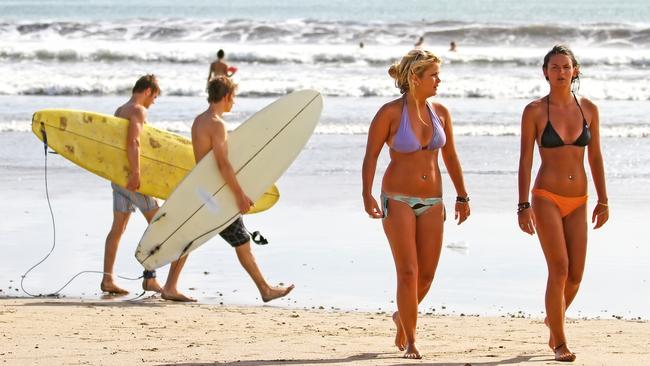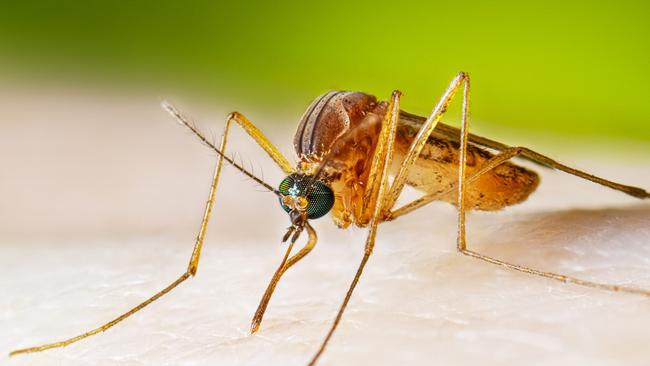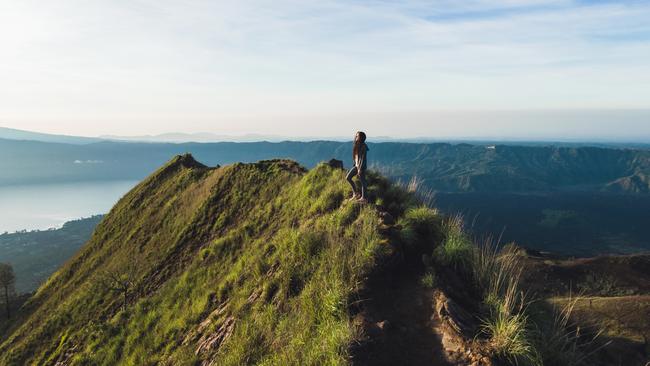Dengue fever cases spike in Bali hitting Australian tourists
Australian travellers are flooding social media with complaints of getting sick, as one popular tourist destination reveals cases have increased 65 per cent.

Travel
Don't miss out on the headlines from Travel. Followed categories will be added to My News.
“Go to Bali, they said. It will be fun, they said.”
The comment, posted to a popular Facebook group for Bali travellers, wasn’t posted from a temple or beach, but an Ubud hospital room where the writer is connected to a drip.
Australian travellers are flooding social media with stories of intense pain, uncontrollable vomiting and temperatures above 39 degrees as amid a dengue fever spike.
One region has reported an uptick of 65 per cent in cases compared to this time last year.
The Queensland woman said she didn’t see a mosquito or get bitten for 10 days, however, she tested positive for dengue fever and has been struggling to keep her temperature down.
“Thank goodness for insurance,” she wrote on social media.
Scores of others have chimed in, sharing diagnoses in a warning to other travellers.


“I went in March and got it on my 30th birthday,” a Sydney woman said.
“It was horrific, don’t wish it upon anybody. The worst part is the fever and body aches.”
“Got home to Darwin, same day the fever and full body rash started,” said another Australian.
“Off the plane, straight to hospital infectious disease isolation ward until they worked it out.”
WHAT IS DENGUE FEVER?
According to the World Health Organisation, dengue fever is a mosquito-borne viral infection that infects 100-400 million people ever year in tropical and subtropical areas.
Most people recover in one or two weeks, but in severe cases, it can be fatal.
The best way to prevent it is by protecting yourself from mosquito bites.
The Bangli region, near Ubud — home to a number of popular tourist sites including Mount Batur and Lake Batur — this week urged visitors to take precautions.


Bangli Health Service boss I Nyoman Arsana told local media public health measures are now in place, including widespread spraying in an attempt to kill adult mosquitoes.
Almost 120 people were diagnosed in the region last month, but none have died.
Insurer Cover-More Australia is reporting a rise in Balinese claims since the start of the year.
“In the first three months of 2024, [we have] seen an average of 322 such claims per month,” said the company’s Australian chief executive, Todd Nelson.
“This indicates a monthly increase in these claim types of about 21 per cent.”
However, the Sydney-based insurance agency said the most common health-related claims have been for ‘Bali belly’, respiratory infections, and injuries such as surfing accidents.
SYMPTOMS OF DENGUE FEVER
Dengue fever may initially present with some of the same symptoms as ‘Bali belly’, including acute abdominal pain, nausea and vomiting, fever and chills, and fatigue.
However, according to Health Direct, other key symptoms to watch for include headaches with pain behind the eyes, swollen glands and a faint red rash.
HOW TO STAY SAFE IN BALI

Australia currently doesn’t offer a dengue fever vaccine to the public.
According to Health Direct, travellers should try to avoid mosquito bites by wearing loose, light-coloured clothing with long sleeves, as well as socks and covered shoes.
Any exposed skin should be treated with a DEET or picaridin-based mosquito repellent.
Travellers are also advised to avoid contact with still water, where mosquitoes breed, and to be extra careful when in areas with a higher risk of mosquito-borne diseases.
Anyone who contracts dengue fever should get medical advice.
Health authorities also recommend resting and drinking plenty of fluids.
Paracetamol may help reduce the risk of fever, but travellers should avoid anti-inflammatory medication such as aspirin and ibuprofen as this may increase the risk of bleeding.
More Coverage
Originally published as Dengue fever cases spike in Bali hitting Australian tourists





